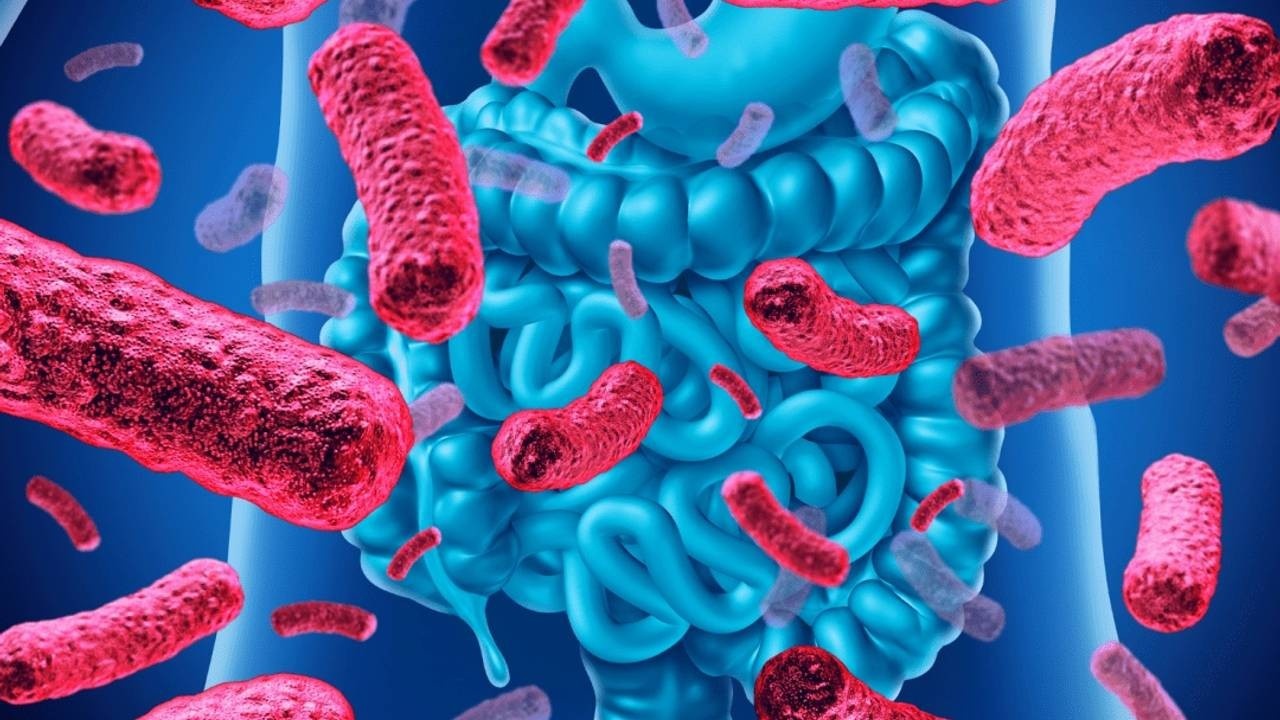Akkermansia muciniphila: A Beneficial Gut Bacteria
Dec 14, 2021
The role of gut bacteria in overall health has been in the spotlight of current medical research. A relatively new bacteria, Akkermansia muciniphila, is believed to have promise in promoting well-being in the gut and throughout the entire body. Once its benefits are fully understood, it can potentially be harnessed to prevent disease and improve overall wellness.

Scanning electronic micrograph of Akkermansia muciniphila. The A. muciniphila strain was isolated from a healthy Chinese donor for FMT at China fmtBank. Bar represents 2 μm. Image from: https://www.ncbi.nlm.nih.gov/pmc/articles/PMC6801136/
What is Akkermansia muciniphila?
Akkermansia muciniphila is an oval-shaped species of bacteria that lives in the mucus lining of the intestines. It comes from a family of microbes known as Verrucomicrobia, and it was discovered in 2004 by isolation from human fecal samples. It is a relatively common bacteria in the intestines, typically constituting about 4% of all intestinal bacteria in adults.
A. muciniphila first inhabits the intestines at about 1 year of age, and it is even found in breast milk and formulas for infants. This microbe has been called a “next-generation beneficial bacteria” by scientists and shows promise in improving health through its roles in metabolism, the immune system, and even some forms of cancer treatment.

What does Akkermansia muciniphila do?
This beneficial microbe forms a symbiotic relationship with the intestines. It feeds on the mucus lining of the intestines, a very important part of the gut barrier. As a result, A. muciniphila stimulates the production of more mucus to replace this lining, which further thickens it. A thicker mucus lining prevents harmful pathogens from entering the intestines and causing disease.
Not only does Akkermansia muciniphila encourage mucus production, but it also produces nutrients essential to the cells of the intestinal tract. It does so by breaking down mucins in the intestines into short-chain fatty acids, a common example of which is acetate. Other bacteria then use this acetate to make butyrate, which is a major source of nutrition for the cells of the digestive system.
What are the health benefits of Akkermansia muciniphila?
It has been recently discovered that Akkermansia muciniphila is associated with several health benefits. These include:
- Preventing obesity: A small pilot study in Brussels including 32 people with metabolic diseases concluded that taking daily tablets of pasteurized A. muciniphila resulted in lower markers of obesity including waist circumference, fat mass, and overall body weight. This finding was promising, but more data needs to be collected to corroborate it. Additionally, this does not mean that taking Akkermansia muciniphila as a probiotic should be a replacement for a healthy diet and lifestyle, according to Patrice Cani, the head researcher for the pilot study.
- Improving the immune system: Scientists have found that A. muciniphila in the lining of the intestines sends signals to the body’s immune receptors, increasing immune function within the gut. Additionally, there has been a decreased amount of A. muciniphila in children with severe allergies, indicating that this bacteria plays a role in regulating immune responses.
- Treating diabetes: A. muciniphila has been found in higher quantities in those with healthy blood sugar levels compared to those with Type II Diabetes or prediabetes. A study on mice reveals that this microbe can increase the efficacy of Metformin, a drug used to treat diabetes. The same study also shows that taking A. muciniphila supplements alone can improve glucose tolerance.
- Assisting in cancer immunotherapy: Akkermansia muciniphila has also been shown to be important in cancer immunotherapy, specifically in therapy involving the anti-PD-1 antibody. In fact, immunotherapy combined with A. muciniphila is expected to be used clinically in the future to obtain better patient responses.
How can we increase levels of Akkermansia muciniphila in our bodies?
There are three main ways to increase the quantity of A. muciniphila in the gut microbiome.

- Eating foods rich in polyphenols: Polyphenols, natural micronutrients found in plants, increase the levels of A. muciniphila in the intestines. Some foods containing polyphenols include flax seeds, grapes, cranberries, black tea, and bamboo shoots.
- Eating healthy fats: Eating healthy, unsaturated fats, such as those found in flax seeds and fish oil, also plays a role in increasing A. muciniphila levels in the gut. On the other hand, eating high amounts of saturated fat is linked to increased inflammation in the gut and has negative effects on gut health.
- Taking a supplement: A final way to increase A. muciniphila in your body is to take a supplement. However, these are very limited, as A. muciniphila is highly difficult to manufacture because it is an anaerobic bacteria. The only currently available Akkermansia supplement is a medical probiotic called Pendulum, meant to manage Type II diabetes.
Summary
Overall, Akkermansia muciniphila is a relatively new bacteria that has been found to have several health benefits. Among these are improved metabolic function, a healthier immune system, a better response to cancer immunotherapy, and increased glucose tolerance in Type II diabetics. Generally, healthier, leaner individuals have higher levels of A. muciniphila in their intestines than those with obesity and various diseases.
A. muciniphila forms a symbiotic relationship with the intestinal lining, breaking down mucin while producing nutrients for intestinal cells and increasing the thickness of the gut barrier. This prevents the entry of any harmful pathogens into the intestines and protects the gut microbiome.
In order to increase levels of Akkermansia muciniphila, one should eat foods rich in polyphenols. Additionally, the consumption of healthy fats, particularly fish oil, aids to increase amounts of this microbe in the intestines. It is possible to raise quantities of A. muciniphila through supplementation as well, but such supplements are not yet widely available.
As a result of its recently-discovered health benefits, scientists have claimed that Akkermansia muciniphila has a promising future as a probiotic. Once more information is known about its mechanisms and scope of influence, it can be harnessed to help treat chronic diseases such as cancer, obesity, diabetes, and immune disorders.






